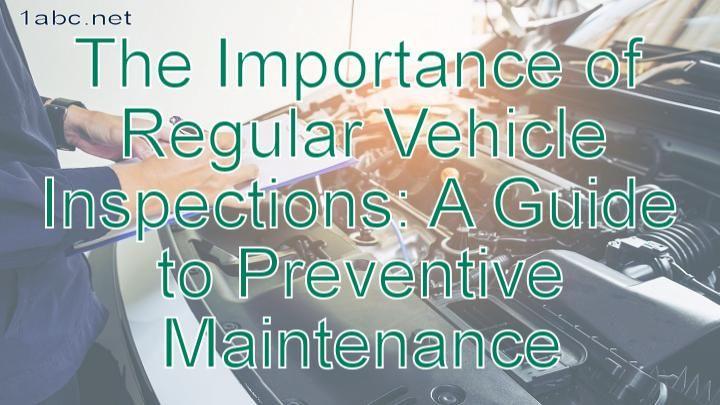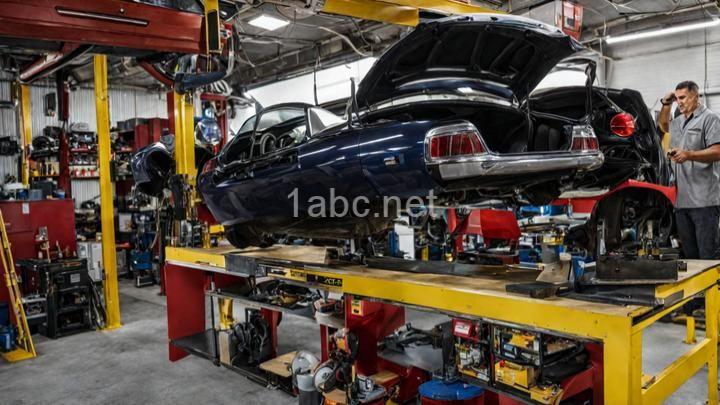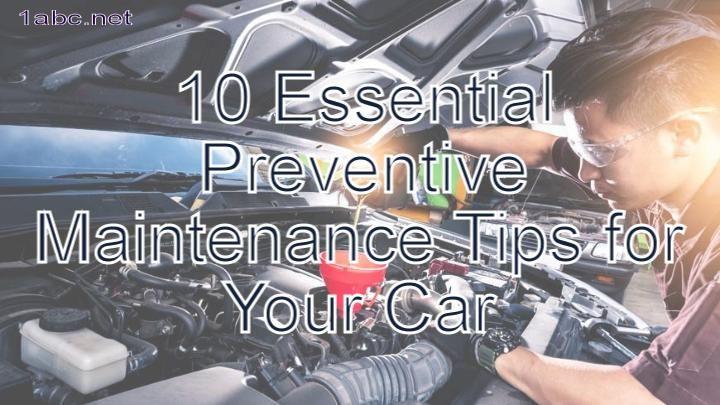The Importance of Regular Vehicle Inspections: A Guide to Preventive Maintenance

Introduction:
Welcome readers! Today, we are going to dive into a topic that is often overlooked but is of utmost importance when it comes to maintaining the health and longevity of our vehicles: regular inspections. Whether you are a car enthusiast or simply rely on your vehicle for daily commute, understanding the significance of preventive maintenance can save you money, time, and even ensure your safety on the road. Neglecting inspections can lead to a cascade of problems that can be both frustrating and costly to fix. So, let's explore why regular vehicle inspections are crucial and how they can prevent potential headaches down the road.
Section 1: Understanding Preventive Maintenance
Preventive maintenance, in the context of vehicles, refers to the proactive care and regular check-ups that help identify potential issues before they become major problems. This approach is all about being proactive rather than reactive. By taking the time to inspect and maintain your vehicle regularly, you can avoid unexpected breakdowns and extend its overall lifespan.
Regular inspections are a crucial aspect of preventive maintenance. They allow you to catch minor issues early on, preventing them from developing into bigger and more expensive repairs. Additionally, inspections give you peace of mind by ensuring that your vehicle is in optimal condition. Whether it's checking the tire pressure or examining the engine components, inspections provide an opportunity to address any potential concerns before they become serious.
Section 2: Key Components to Inspect Regularly
Now that we understand the importance of regular inspections, let's delve into the key components that should be inspected regularly to keep your vehicle in top shape and avoid any unwanted surprises.
- Tires and Wheels: Regularly checking the tire pressure, tread depth, and wheel alignment can improve fuel efficiency, enhance handling, and maximize tire lifespan. Adequate tire maintenance is also crucial for ensuring optimal braking and overall safety.
- Fluid Levels and Quality: Fluids such as engine oil, coolant, transmission fluid, and brake fluid play a vital role in the performance and longevity of your vehicle. Regularly checking the levels and quality of these fluids is essential to prevent engine damage, overheating, or brake failure.
- Brakes and Steering System: The brakes and steering system are critical for your safety on the road. Regular inspections help identify any signs of wear or malfunction, ensuring that your brakes are responsive and your steering is precise.
- Lights and Electrical System: Faulty lights or electrical issues can compromise your visibility and safety while driving. Regular inspection of headlights, taillights, turn signals, and the overall electrical system can help detect any faulty wiring or burnt-out bulbs, ensuring that you are visible to other drivers and that your vehicle's electrical components are functioning properly.
- Belts and Hoses: Belts and hoses play a crucial role in the proper functioning of your vehicle's engine. Inspecting them regularly for signs of wear or cracks can prevent unexpected breakdowns and potential engine damage.
- Battery Health: A healthy battery is essential for starting your vehicle reliably. Regular inspection of the battery terminals, cables, and overall health can prevent sudden breakdowns and ensure that you're not left stranded.
Section 3: Recommended Inspection Intervals
While it's important to inspect your vehicle regularly, the specific intervals may vary depending on factors such as mileage, vehicle make, model, and usage patterns. As a general guideline, it is recommended to schedule inspections every three months or every 5,000 miles. However, it's always a good idea to consult your vehicle's owner manual or reach out to a trusted mechanic for specific recommendations based on your vehicle's unique requirements.
Section 4: DIY vs. Professional Inspections
Now that we've covered what components to inspect and how often, let's discuss whether you should tackle these inspections yourself or seek professional help.
Simple tasks like checking fluid levels, tire pressure, and lights can be easily performed by car owners themselves. Regularly performing these simple inspections can help you stay proactive and catch any potential issues early on. However, for more complex tasks such as diagnosing engine problems or inspecting intricate electrical systems, it is highly recommended to seek the help of a trained technician. They have the expertise, specialized equipment, and knowledge to identify and address issues that may not be apparent to an untrained eye.
Section 5: Signs Indicating Immediate Inspection Needs
While regular inspections are vital, it's equally important to be aware of warning signs that indicate an immediate need for inspection. Ignoring these signs can lead to further damage and potentially dangerous situations. Some common signs include:
- Strange noises or vibrations: Unusual sounds or vibrations while driving may indicate underlying issues with your vehicle's suspension, brakes, or engine. These should be inspected promptly to prevent further damage.
- Dashboard warning lights: Dashboard warning lights, such as the check engine light or ABS warning light, should never be ignored. They are designed to alert you of potential issues that require immediate attention.
- Fluid leaks or unusual smells: Any leaks or unusual smells, such as burnt oil or coolant, should be inspected immediately. These may be indicative of a leaking gasket or a malfunctioning component that needs immediate attention.
Conclusion:
Regular vehicle inspections are not just a good practice, but a crucial step in ensuring the health and longevity of your vehicle. By being proactive and addressing potential issues early on, you can save yourself from unexpected breakdowns, expensive repairs, and even accidents. So, prioritize your vehicle's health by scheduling routine inspections. Whether you choose to perform simple inspections yourself or seek professional help, remember that taking care of your vehicle today will save you time, money, and headaches in the long run. Don't wait for warning signs or dashboard lights to appear; take action now and stay on top of your vehicle's maintenance needs. Book an inspection appointment with a trusted mechanic or contact your local dealership to ensure your vehicle remains in optimal condition. Your vehicle will thank you, and you'll have peace of mind knowing you're driving safely and with confidence.
FREQUENTLY ASKED QUESTIONS
Why are regular vehicle inspections important?
Regular vehicle inspections are important for several reasons:
- Safety: Inspections help ensure that vehicles are in good working condition, reducing the risk of accidents or breakdowns caused by faulty brakes, tires, lights, or other essential components.
- Compliance with regulations: Many jurisdictions have laws that require vehicles to undergo periodic inspections to ensure they meet safety and environmental standards. By getting regular inspections, vehicle owners can ensure compliance with these regulations and avoid potential fines or penalties.
- Preventive maintenance: Inspections help identify and address minor issues before they escalate into major problems. Catching and fixing issues early can prevent costly repairs down the road and increase the overall lifespan of the vehicle.
- Resale value: Vehicles with a documented history of regular inspections often have higher resale value. Prospective buyers are more likely to trust and be willing to pay more for a vehicle that has been well-maintained.
Overall, regular vehicle inspections promote safety, compliance, maintenance, and can have financial benefits in terms of preventing costly repairs and maintaining resale value.
What are the benefits of regular vehicle inspections?
Regular vehicle inspections offer several benefits:
- Safety: Inspections help ensure that the vehicle is in a safe operating condition, reducing the risk of accidents or breakdowns caused by mechanical failures.
- Compliance: Many countries and regions have laws and regulations that require regular vehicle inspections to ensure compliance with safety and emissions standards. Inspections help vehicle owners avoid legal issues and penalties.
- Early problem detection: Inspections can uncover minor issues or potential problems before they turn into major and costly repairs. Finding and fixing problems early can save money and extend the lifespan of a vehicle.
- Improved fuel efficiency: Inspections may include checks on the vehicle's fuel system, tire pressure, and overall efficiency. Identifying and addressing issues that negatively impact fuel efficiency can result in cost savings over time.
- Environmental impact: Inspections often include emission checks, which can help identify vehicles that are producing excessive pollutants. By addressing these issues, inspections contribute to reducing air pollution and environmental harm.
- Insurance requirements: Some insurance policies require regular inspections as a condition for coverage. By complying with these requirements, vehicle owners can maintain their insurance coverage and potentially qualify for reduced premiums.
Overall, regular vehicle inspections provide peace of mind, promote road safety, help maintain a vehicle's value, and contribute to a more sustainable transportation system.
How long does a typical vehicle inspection take?
The duration of a typical vehicle inspection can vary depending on several factors, such as the type of inspection being performed, the condition of the vehicle, and the efficiency of the inspection station. On average, a basic vehicle inspection can take anywhere from 30 minutes to an hour. However, more extensive inspections that include additional checks and tests may take longer, potentially up to a couple of hours. It's always a good idea to check with your local inspection station or mechanic for more accurate time estimates based on your specific needs.
Should I get my vehicle inspected even if it seems to be running fine?
Yes, it is always recommended to get your vehicle inspected regularly, even if it appears to be running fine. Regular inspections help identify any potential issues or maintenance needs that may not be immediately noticeable. By getting your vehicle inspected, you can catch and address any problems early on, which can potentially save you from costly repairs in the future and ensure the safety and efficiency of your vehicle. It is a good practice to follow the manufacturer's recommended maintenance schedule and consult with a qualified mechanic or automotive technician for regular inspections.
How long does a vehicle inspection typically take?
The duration of a vehicle inspection can vary depending on various factors such as the type of inspection being conducted, the complexity of the vehicle, and the efficiency of the inspection facility. On average, a basic vehicle inspection can take anywhere from 30 minutes to an hour. However, more comprehensive inspections or those involving specialized checks may take longer, potentially up to a few hours. It's always a good idea to check with the specific inspection facility for a more accurate estimate of their inspection times.
How much does a vehicle inspection cost?
The cost of a vehicle inspection can vary depending on several factors, such as the location, type of inspection, and the specific requirements of the inspection. In general, a basic vehicle inspection can range from $50 to $100. However, specialized inspections, such as emissions inspections or safety inspections, may have additional fees. It's best to check with your local Department of Motor Vehicles (DMV) or authorized inspection centers to get accurate pricing information for your specific area.




